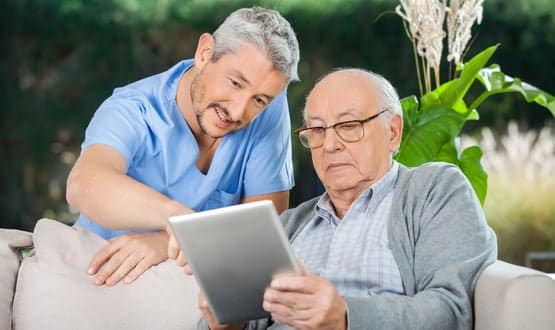World Health Organisation launches app to improve care for the elderly

The World Health Organisation (WHO) has launched a digital app to provide health and social workers with an easy-to-use tool to deliver better care for older people.
The interactive app, called WHO ICOPE Handbook App, provides guidance on priority conditions including mobility limitations, malnutrition, vision and hearing loss, cognitive decline, depressive symptoms and social care and support.
It’s hoped the app, launched in conjunction with a package of tools, will accelerate the learning of health and social care workers.
Dr Anshu Banerjee, director of the department of maternal, new-born, child and adolescent health and ageing at the World Health Organisation (WHO), said: “It is essential that services for older people are included in universal health care packages.
“At the same time there needs to be good coordination between the health and social services to provide optimal care when needed.
“The new package of tools supports healthy ageing with a person-centred and coordinated model of care.”
The Integrated Care for Older People package of tools is the result of two years of extensive consultations with leading experts and stakeholders including civil society representatives, the WHO said.
Preparing health and social care workers for the diverse physical and mental problems that face older people is vital in the face of a population ageing at a rapid rate.
By 2050 one in five people will be aged over 60 and the number of people aged over 80 is projected to triple from 143 million to 426 million, according to the WHO.
Dr Islene Araujo de Carvalho, group lead on ageing and integrated care at WHO, added: “Such innovation will enable older people to continue doing the things they value and prevent them from social isolation and care dependency.
“Intervening close to where older people live, with active participation of the community and older persons themselves, is essential for a personalised care plan.”
The WHO has recognised the importance of digital services in healthcare, releasing its first guidance in on digital health technologies for health workers, policy makers and suppliers.
The 10 recommendations, published in May, suggest digital technology can help improve healthcare but should not be seen as a “silver bullet”.
WHO has also developed the Digital Health Atlas, an online global repository where vendors can register their digital health activities, to support governments in coordinating digital investments.
In March this year the WHO announced the creation of the Department of Digital Health to help the organisation assess digital technologies.
READ MORE
- World Health Organisation releases first guidance on digital health technologies
- Imperial College opens £20m centre to develop dementia-friendly homes
- ‘Smart homes’ to boost older people’s digital skills in West Essex



